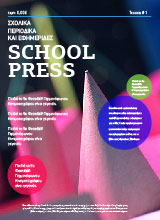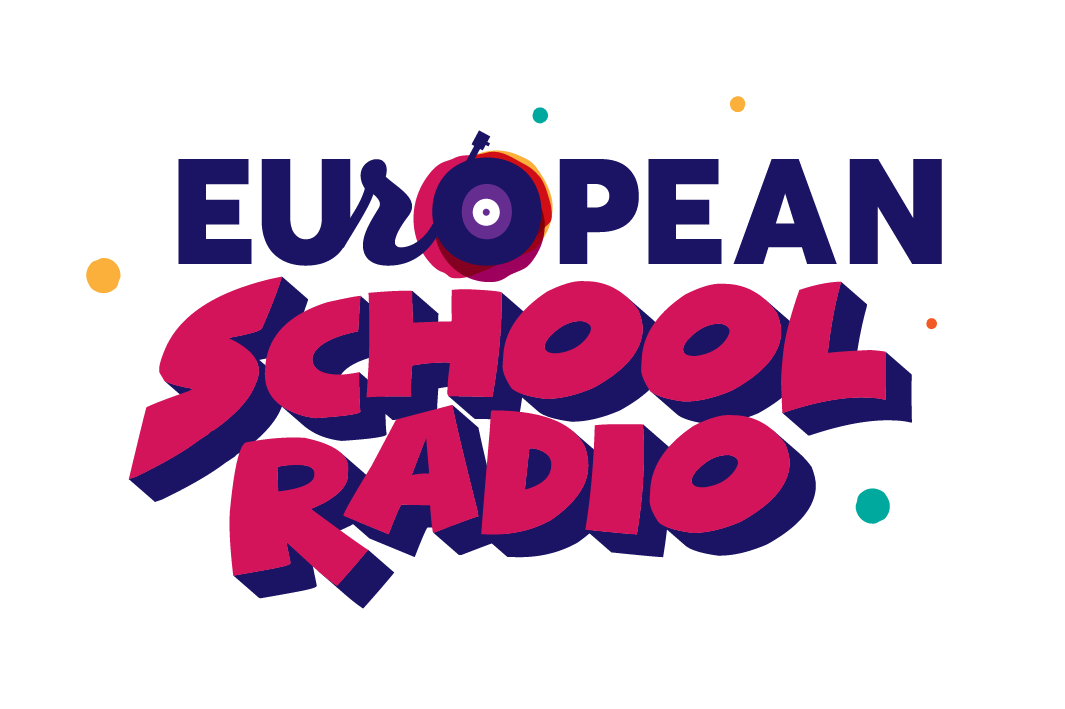Searching, participating, negotiating
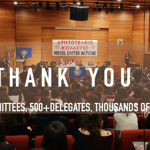
Η συμμετοχή του σχολείου μας στο 15ο Μοντέλο Ηνωμένων Εθνών (MUN) του Αριστοτελείου Κολλεγίου στις 2,3,4 Μαρτίου 2017 ολοκληρώθηκε με επιτυχία και τα συναισθήματα όλων των μαθητών που πήραν μέρος ανάμεικτα: Ενθουσιασμός, κούραση, νέες γνωριμίες, αυτοπεποίθηση, ρητορική δυνότητα και πάνω από όλα μια αξέχαστη εμπειρία γνώσης. Οι 12 μαθητές μας εκπροσώπησαν στις εργασίες του συνεδρίου την Νορβηγία και την Αλγερία και διατύπωσαν τις θέσεις και τις προτάσεις των χωρών αυτών σε διάφορες επιτροπές. Τα θέματα τις φετινής ατζέντας ήταν ιδιαίτερα επίκαιρα, όπως:
- Η προστασία της ελευθερίας του Τύπου
- Ο ρόλος της UNESCO στην προώθηση της εκπαίδευσης ως εργαλείο για την αντιμετώπιση φαινομένων βίας
- Το ζήτημα της εμπορίας ανθρώπων
- Μέτρα για την αντιμετώπιση της διεθνούς τρομοκρατίας
- Αειφόρος Ανάπτυξη: Το δικαίωμα της πρόσβασης σε καθαρό νερό
- Η προστασία των παιδιών σε εμπόλεμες καταστάσεις
- Η Παγκόσμια κρίση στην χρήση Αντιβιωτικών
- Το ζήτημα του γάμου ανηλίκων
Οι μαθητές που συμμετείχαν ήταν:
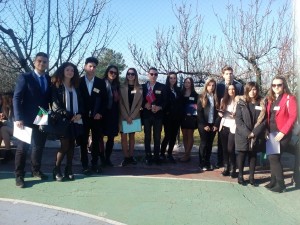 Model of United Nations 2017(ARC MUN):
Model of United Nations 2017(ARC MUN):
1. Κανετίδης Δημήτρης (Α1) NORWAY –WHO (The global Antibiotic resistance crisis)
2. Αγγέλογλου Μαρία(Α1) NORWAY- ECOSOC( Achieving sustainable development-universal access to clean water)
3. Στάμου Έφη (Α4) NORWAY - SOCHUM(Tackling the issue of human trafficking: prevention, protection and prosecution)
4. Καμπάνη Δήμητρα (Α4) NORWAY- UNHRC (Protection of children in armed conflict)
5. Ντάλη Νικολέτα (Α4) NORWAY- UNICEF (The issue of child marriage)
6. Ανθοπούλου Σελήνη (Α1) observer (Ensuring media freedom and protection of the journalists)
7. Λαζαρίδης Μάρκος (Α2) observer
8. Φίγγου Ευαγγελία (Α4) observer
9. Ηλιάδης Πέτρος (Α4) NORWAY- 4TH GA- LEGAL(Measures to eliminate international terrorism)
10. Mποζουτσίδης Μάνος (Β2) NORWAY- UNESCO(Promoting education as a tool to prevent violent extremism)
11. Ανθοπούλου Ελπίδα (Α2)ALGERIA-UNESCO(Promoting education as a tool to prevent violent extremism)
12. Πουρή Κατερίνα (Β1) ALGERIA-SOCHUM(Tackling the issue of human trafficking: prevention, protection and prosecution)
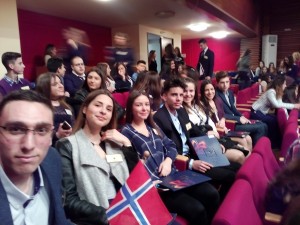
Τιμητική διάκριση έλαβε τόσο η ομάδα των τριών μαθητών που πήραν μέρος ως παρατηρητές, όσο και ο Μάνος Μποζουτσίδης, αφού λόγω της ενεργής συμμετοχής και της πολύ καλής προετοιμασίας τους κατάφεραν να ξεχωρίσουν και γι αυτό το λόγο να επιβραβευθούν.
Ενδεικτικά, παραθέτουμε το κείμενο θέσης (position paper) που ξεχώρισε και αφορά στο δικαίωμα της ελευθερίας του Τύπου.
Συγχαρητήρια σε όλους!
Η υπεύθυνη καθηγήτρια,
Καρασούλη Άσπα (ΠΕ06)
Special Observer’s Committee
Topic: Ensuring media freedom and protection of journalists
Country: Norway
Delegates: Anthopoulou Selini, Lazaridis Markos, Figgou Evaggelia
The Universal Declaration of Human Rights in Article 19 provides that “everyone has the right to freedom of opinion and expression; this right includes freedom to hold opinions without interference and to seek, receive and impart information and ideas through any media and without frontiers”. Moreover, freedom of speech and consequently media freedom is protected under Article 19 of the International Covenant on Civil and Political Rights (ICCPR) and Article 10 of the European Convention on Human Rights (ECHR).
Journalists are entitled to all rights and protections granted to civilians in international armed conflicts according to the Article 4 A (A) of the Third Geneva Convention as well as Article 79 of the Additional Protocol I .
Although the aforementioned treaties are signed by the majority of the U.N. Member States, the implementation, safeguard and promotion of these rights depends on each state’s political discretion and domestic legislative initiative. Thus, domestic legislations seem to be highly divergent as far as freedom of press is concerned and most importantly journalists do not enjoy the same amount of protection and independence in every country, even the ones considered socially liberal. The following facts can be quite clarifying about the global situation.
Press freedom declined to its lowest point in 12 years in 2015, as political, criminal, and terrorist forces sought to co-opt or silence the media in their broader struggle for power.
Only 13 percent of the world’s population enjoys a Free press—that is, where coverage of political news is robust, the safety of journalists is guaranteed, state intrusion in media affairs is minimal, and the press is not subject to onerous legal or economic pressures.Even in the much more open media environments of Europe, journalists faced unusual levels of pressure from terrorists and, to an extent, their own governments. The varied threats to press freedom around the world are making it harder for media workers to do their jobs, and the public is increasingly deprived of unbiased information and in-depth reporting.
Over the past 10 years, Europe as a whole has suffered the largest drop in press freedom of any region in the Freedom of the Press report. This has been driven in part by weakened European economies and shrinking advertising revenues, which have led to layoffs, closure of outlets, and further concentration of media ownership. Other contributing factors include new laws restricting media activity, and increases in violence against and intimidation of journalists in retaliation for their reporting.In the Freedom of the Press 2016 report, each country and territory receives a numerical score from 0 (the most free) to 100 (the least free), which serves as the basis for a status and Norway has been ranked as the freest country in the global list regarding Press freedom.
Undoutedly, Norway is a country that defends the right of freedom of expression and also ensures media freedom and protection for journalists.
In order to prevent the cases of threatening the right of journalists and media to collect and share information, the Government will step up its efforts to support independent media, provide protection for people who express their opinions publicly, and improve public access to information. Moreover, the Foreign Minister in a speech said that ‘Freedom of expression is the foundation on which all other democratic freedoms rest. Freedom of expression must be safeguarded and promoted tirelessly, every day and in every single country.’
There are far too many cases of harassment, intimidation and attacks on journalists, human rights defenders and other people who speak out in public. Many such attacks are never investigated and there are generally no consequences for the perpetrators.However, the Ministry of Foreign Affairs will support projects to provide legal and practical assistance to people who are at risk because they speak out, and projects to build up fair and effective legal systems. Furthermore, there is The European Centre for Press and Media Freedom (ECPMF) which is a membership-organisation and serves as contact point for individual journalists in danger.Founded in 2015 and based in Leipzig, Germany, the ECPMF aims at uniting the media freedom community in Europe.
In conclusion we can easily understand that Norway is a country that defends the right to freedom of expression and the Government tries to ensure that right. However, journalists and bloggers should continue showing resilience. Often at great risk to their lives, they strive to transmit information to their communities and the outside world, and circulate views that contradict those promoted by governments or extremist groups.
Σχολιάστε
Για να σχολιάσετε πρέπει να συνδεθείτε.

